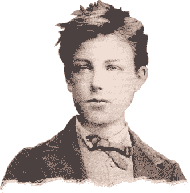
Arthur Rimbaud
(1854—1891)

Vowels
|
A black, E white, I red, U green, O blue: vowels, |
. . .
Voyelles
|
|---|
A noir, E blanc, I rouge, U vert, O bleu: voyelles,
Je dirai quelque jour vos naissances latentes: A, noir corset velu des mouches éclatantes Qui bombinent autour des puanteurs cruelles, Golfes d'ombre; E, candeurs des vapeurs et des tentes, Lances des glaciers fiers, rois blancs, frissons d'ombelles; I, pourpres, sang craché, rire des lèvres belles Dans la colère ou les ivresses pénitentes; U, cycles, vibrements divins des mers virides, Paix des pâtis semés d'animaux, paix des rides Que l'alchimie imprime aux grands fronts studieux; O, suprême Clairon plein des strideurs étranges, Silences traversés des [Mondes et des Anges]: —O l'Oméga, rayon violet de [Ses] Yeux! |
. . .
| Arthur Rimbaud, (1854-1891) the anarchic visionary, precocious boy-poet of French symbolism, wrote some of the most remarkable poetry and prose of the 19th century. Especially in 'A Season in Hell' (1873), Rimbaud is the poet of crystallized attitudes, of flash-frozen poses. His highly suggestive, subtle work drew on subconscious sources, and its form was correspondingly supple and novel. Rimbaud has been identified as one of the creators of free verse because of the rhythmic experiments in his prose poems 'Illuminations' (1886). Paul Claudel, saw Rimbaud as "a mystic in the savage state". *Synesthesia: his Sonnet of the 'Vowels' (1871) in which each vowel is assigned a color, helped popularize synesthesia. Christian Bök's Translations of Voyelles |
No comments:
Post a Comment